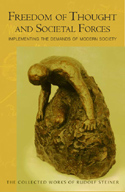
-
FREEDOM OF THOUGHT AND SOCIETAL FORCES
Implementing the Demands of Modern Society
Rudolf Steiner

Freedom of Thought and Societal Forces provides a broad overview of Steiner’s fresh thinking on "social threefolding". He acknowledged that the demand for social change, derived above all from the working class, whom industrialization had forced into a kind of indentured life dominated by economics. From Steiner's perspective, the underlying issue was not only economic, however, but also spiritual or cultural. Culture and the cultured classes had become estranged from "real life". Society needed a "free" culture that would include all classes. It also needed to shift labour into the legal sphere of rights, the only place where workers could find real freedom in society. Capital, too, needed to be liberated from egotism and allowed, like goods, simply to circulate. Above all, Steiner understood that social realities could not be separated from the spiritual realities of human existence.
From this point of view, we lack knowledge of ourselves as a spiritual beings. Thinking has become abstract. To remedy this, we must first admit it and develop modesty and humility. Second, we must increase our capacity to love one another and the world. Approaching this reality from another side, we see that what ordinary individual thinking also afflicts culture in general, which is also removed from reality. Culture, like thinking, must become alive and universally human. This is impossible, however, unless we develop what Steiner calls "freedom of thought". Authentic freedom of thought is always ethical and overcomes egotism. Indeed, a more general exercise of freedom in thought, as Steiner conceives it, provides a way through the twin dangers of materialism and abstraction, which together threaten society both in the narrower sense of "national" life and in the more global, geopolitical sense
Freedom of Thought and Societal Forces is the first English translation from German of 'Gedankenfreiheit und soziale Kräfte' (GA 333).
Jan 2009; Catherine E. Creeger; (6 lectures, various cities, May 26-Dec. 30, 1919; GA 333); SB; 248pp; 23 x 15 cm; pb;
£17.99 ISBN 9780880105972

